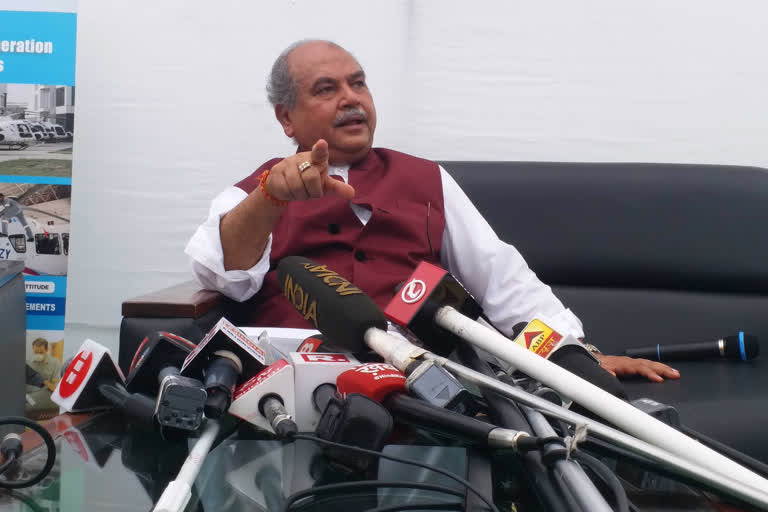Jaipur: In a first-of-its-kind initiative in the country, helicopters were deployed for spraying pesticides as a part of ongoing locust control measures in Rajasthan on Tuesday.
Union Minister Narendra Singh Tomar flagged off four helicopters (Bell 206-B3) from a helipad facility in Greater Noida of Uttar Pradesh and stated that the spraying of pesticides had begun from 1 pm and it would stop the spread of the swarms more effectively.
"For the first time in history, helicopters were used to tackle the locust outbreak. Apart from this, 45 new machines will be available by July 11, so the action against the spread of the swarms will be taken up more effectively," Tomar said during a presser.
"Four helicopters from the Indian Air Force (IAF), stationed at the Air Force Station in Uttarlai - Barmer as per the protocol, have been identified for this initiative. The equipment for aerial application retrofitted in the helicopters have been sourced from Britain and we are hopeful to completely stop attacks by locusts by September-end," Tomar said.
According to sources, Union Minister Narendra Tomar and Minister of State for Agriculture Kailash Choudhary will also flag off similar operations in Uttar Pradesh and Madhya Pradesh. The spraying will be done in five districts of Rajasthan in the next few days as fresh swarms threaten to come towards the desert state from neighbouring Pakistan.
The helicopters will be used to spray chemicals in the desert districts of Barmer, Jaisalmer, Bikaner, Jodhpur and Nagaur, as per protocol, an official statement said.
Union Minister of State for Agriculture and Farmers Welfare Kailash Chaudhary said that all the preparations have been finalised for this operation as the central government is taking this issue seriously.
Along with the use of drones for spraying pesticides on trees and in inaccessible areas, preparations have also been completed to use helicopter services. He further said that 11 control rooms have been set up and special forces have also been deployed for locust control.
Also read: Swarm of locusts reaches Rajasthan's Dholpur
Chaudhary said that a high-level meeting on locust control was reviewed on Thursday and 11 control rooms have been set up and special forces deployed for locust control.
Along with this, additional employees have also been engaged along with farmers at various places.
Currently, 47 spray equipment are being used for locust control and 60 additional equipment have been ordered from the UK.
On the request of the Rajasthan government, the Central Government approved Rs. 2.86 crore for the purchase of 800 spray equipment.
The locusts, which normally settle on trees during the night and fly during the day, have been controlled in about on an area of 50,468 hectares in Madhya Pradesh, Rajasthan, Gujarat, Uttar Pradesh and Punjab.
Farmers grow mainly rice, pulses, cotton, sugarcane and soybeans on about 106 million hectares during the monsoon season between June and September.
In January, the biggest locust swarm to hit Gujarat in over a quarter of a century resulted in more than 25,000 hectares of wheat, rapeseed, cumin and potatoes being attacked, with at least a third of the crops damaged in 75 per cent of the affected areas.
Also read: FAKE alert: No, Amit Shah didn't say internet will be snapped in JK, Ladakh
Desert locusts often attack North Africa, the Middle East and South Asia, usually when heavy rains follow droughts. They generally enter the desert areas of India via Pakistan for breeding during the four-month rainy season that starts in June.
But they were reported as early as April in Rajasthan and Punjab.



